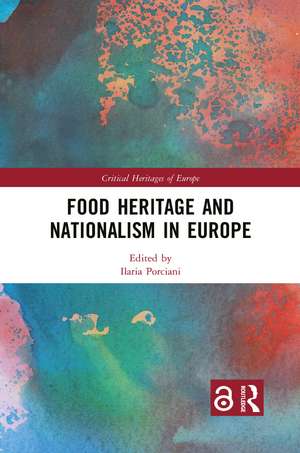Food Heritage and Nationalism in Europe: Critical Heritages of Europe
Editat de Ilaria Porcianien Limba Engleză Paperback – 30 iun 2021
Featuring contributions from experts working across Europe and beyond, and adopting a strong historical and transnational perspective, the book examines the various ways in which food can be understood and used as heritage. Including explorations of imperial spaces, migrations and diasporas; the role of commercialisation processes, and institutional practices within political and cultural domains, this volume considers all aspects of this complex issue. Arguing that the various European cuisines are the result of exchanges, hybridities and complex historical processes, Porciani and the chapter authors offer up a new way of deconstructing banal nationalism and of moving away from the idea of static identities.
Suggesting a new and different approach to the idea of so-called national cuisines, Food Heritage and Nationalism in Europe will be a compelling read for academic audiences in museum and heritage studies, cultural and food studies, anthropology and history.
Chapters 1,2,4,6 and 12 of this book are available for free in PDF format as Open Access from the individual product page at www.routledge.com. They have been made available under a Creative Commons Attribution-Non Commercial-No Derivatives 4.0 license
| Toate formatele și edițiile | Preț | Express |
|---|---|---|
| Paperback (1) | 385.41 lei 6-8 săpt. | |
| Taylor & Francis – 30 iun 2021 | 385.41 lei 6-8 săpt. | |
| Hardback (1) | 764.20 lei 6-8 săpt. | |
| Taylor & Francis – 13 noi 2019 | 764.20 lei 6-8 săpt. |
Preț: 385.41 lei
Nou
Puncte Express: 578
Preț estimativ în valută:
73.77€ • 76.72$ • 61.82£
73.77€ • 76.72$ • 61.82£
Carte tipărită la comandă
Livrare economică 13-27 martie
Preluare comenzi: 021 569.72.76
Specificații
ISBN-13: 9781032086101
ISBN-10: 1032086106
Pagini: 236
Ilustrații: 22 Illustrations, black and white
Dimensiuni: 156 x 234 x 13 mm
Greutate: 0.35 kg
Ediția:1
Editura: Taylor & Francis
Colecția Routledge
Seria Critical Heritages of Europe
Locul publicării:Oxford, United Kingdom
ISBN-10: 1032086106
Pagini: 236
Ilustrații: 22 Illustrations, black and white
Dimensiuni: 156 x 234 x 13 mm
Greutate: 0.35 kg
Ediția:1
Editura: Taylor & Francis
Colecția Routledge
Seria Critical Heritages of Europe
Locul publicării:Oxford, United Kingdom
Public țintă
PostgraduateCuprins
Introduction
- Food Heritage and Nationalism in Europe
Ilaria Porciani
Part I: Heritagization and Political Uses of Food - Heritage and Food History. A Critical Assessment
Laura di Fiore - Tradition, Heritage, and Intellectual Property in the Global Food Market
Fabio Parasecoli - Food and Locality. Heritagization and Commercial Use of the Past
Paolo Capuzzo - In the Kitchens of ‘68. The Impact of Student Protest and Counter-Culture on Attitudes towards Food Marica Tolomelli
- A Place at the Table? Food in Museums as an "Ersatz Politics" of Difficulty
Susannah Eckersley
Part II: Contact Zones and Exchanges - A Taste for Diversity
Massimo Montanari - Francis Joseph's Tafelspitz. The Austro–Hungarian Cooking as an Imperial Project
Catherine Horel - Images, Perceptions and Authenticity in Ottoman–Turkish Cuisine
Özge Samancı - Station Buffets and Universal Exhibitions. Places of Mobility for Crossing Food Cultures
Jean-Pierre Williot - Canteens, Cafes and Cabarets. The Food Culture of the Russian Diaspora in Shanghai, 1920–1950 Katya Knyazeva
- Conclusion. Careful with Heritage
Ilaria Porciani and Massimo Montanari
Notă biografică
Ilaria Porciani teaches modern and contemporary history at the University of Bologna. She has published widely on the history of education, culture, the university, historiography and nation-building, often incorporating a gender approach. Her present research interests focus on public history, history museums and food history.
Recenzii
'The book is announcedly transnational.'
Susan H. Gordon, MFA, Forbes
Susan H. Gordon, MFA, Forbes
Descriere
Food Heritage and Nationalism in Europe contends that food, taste, cuisine, and gastronomy are crucial markers of identity that are inherently connected to constructions of place, tradition and the past, and demonstrates how they play a role in intangible, as well as tangible, heritage.











